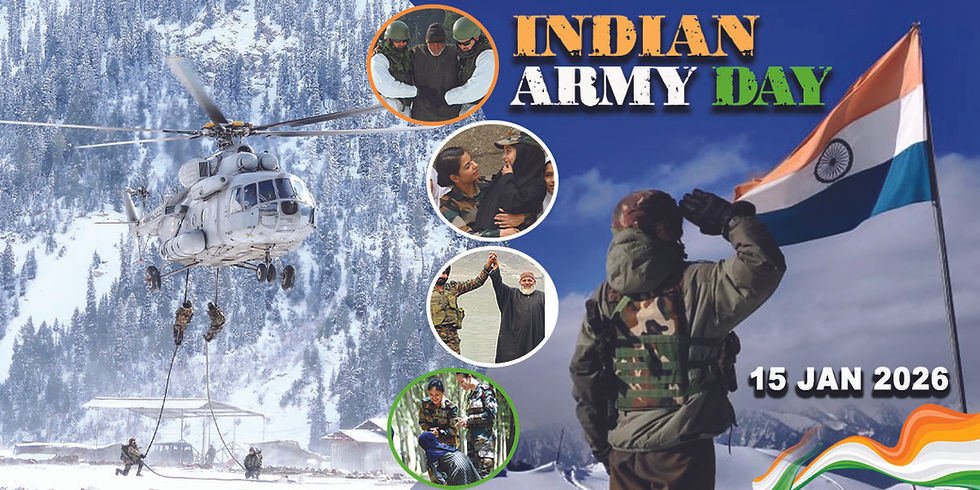SAVIOURS OF KASHMIR: LT COL DEWAN RANJIT RAI
- Soldier Stories Of Kashmir

- Oct 28, 2021
- 3 min read
It is the cause and not the death, that makes the martyr -Napoleon Bonaparte

Lieutenant Colonel Dewan Ranjit Rai, MVC was an officer of the Indian Army, who played an important role during the War of 1947 with Pakistan. As the Commanding Officer of the 1st battalion, The Sikh Regiment, he became the first awardee of Maha Vir Chakra, posthumously. 1 Sikh was the first unit of Indian Army to take part in the war, when it was airlifted from Gurugram to Srinagar on 27 October 1947. The same day is celebrated as the Infantry Day in the Indian Army. Lt Col Ranjit Rai was born in Gujranwala on 6 February 1913. He got his primary education at the Bishop Cotton School, Shimla. He attended the first course at the Indian Military Academy, Dehradun Col Rai was commissioned on the 1 February 1935, when he was just 22 years old. He was attached for a year to a British Army regiment, the King's Shropshire Light Infantry stationed in India. He was appointed to the Indian Army and posted to the 5th battalion, 11th Sikh Regiment. He was among the first Indian officers to be posted to as an instructor Command and Staff College, Quetta. He was selected for posting to Washington in USA, just before the beginning of the Indo-Pakistani War of 1947 but this assignment was changed when he was selected for this mission to Kashmir.
The First Kashmir War or the Indo-Pakistani War of 1947–1948 was a war that was fought between India and Pakistan for state of Jammu and Kashmir. It was the first of four Indo-Pakistani wars that was fought between these two countries. Pakistan started the war a few weeks after its freedom, by beginning tribal lashkar invasion, with an intention to occupy Kashmir and to stop the ruler from joining India. By executing Instrument of Accession, under the provisions of the Indian Independence Act 1947, Maharaja Hari Singh agreed to accede to the Dominion of India. After the agreement, India airlifted troops and equipment to Srinagar under the command of Lieutenant Colonel Dewan Ranjit Rai, where they were supposed fight alongside the Jammu and Kashmir state forces.
On October 27, when the first set of Indian troops, the 1st Battalion of the Sikh Regiment landed at Srinagar, Pakistani invaders were already in Baramulla. Just 35 miles of road was the distance between the invaders and Srinagar. The fate of Srinagar was uncertain, with negligible information regarding the situation in Srinagar, having reached Delhi. Under these settings, the 1st Sikh Battalion flown from Delhi under Commanding Officer, Lieutenant Colonel Dewan Ranjit Rai, were given clear directions, “to check the airfield before landing in Srinagar and confirm if the airfield had been occupied by the enemy.” Instructions to Lieutenant Colonel Rai were not to land if there was any uncertainty and fly back to Jammu. Upon landing, Lt Col Dewan Ranjit Rai had to take a decision — either to engage the intruders, who were more than his small force, or wait till adequate Indian troops arrived. He took the courageous decision and charged onto the intruders at Baramulla. The raiders were organised, armed with machine guns and mortars. Lieutenant Colonel Rai decided to fall back and occupy Pattan, a place nearly in between Srinagar and Baramulla. He stayed with the forward section to safeguard all his troops and they move back safe and sound. At this stage, a sniper's bullet injured him. He was by then successful in stopping the adversary's forward advance.

Rai commanded his troops to guard the Baramulla-Srinagar highway near Pattan against the numerically more Pakistani tribal irregulars who were moving towards Srinagar after looting, raping and burning people in Baramulla. He effectively protected the Srinagar airfield, making way for more Indian troops to land at Srinagar’s Old Airfield who pushed back the Pakistani tribal irregulars. He was martyred on 27 October 1947 leading his men and protecting Pattan. He was the first officer of the Indian Army, after independence to fight a battle. A very little time was at his disposal, he himself conducted recce and operations at such peril to his own life, that he was eventually martyred. By his complete neglect of his personal safety, but safety and security of his men ahead of his own’s, his fortitude and enthusiastic leadership, the invaders were stopped sufficiently far away from Srinagar to enable Indian Forces to arrive, which eventually resulted in decisive defeat of Intruders, in turn Pakistan. The officer was martyred, in an effective endeavour to save Srinagar by exhibiting bravery of the highest order for which was awarded Maha Vir Chakra (Posthumously).
Lt Col Dewan Ranjit Rai had to take a decision — either to engage the intruders, who were more than his small force, or wait till adequate Indian troops arrived. He took the courageous decision and charged onto the intruders at Baramulla.






Comments